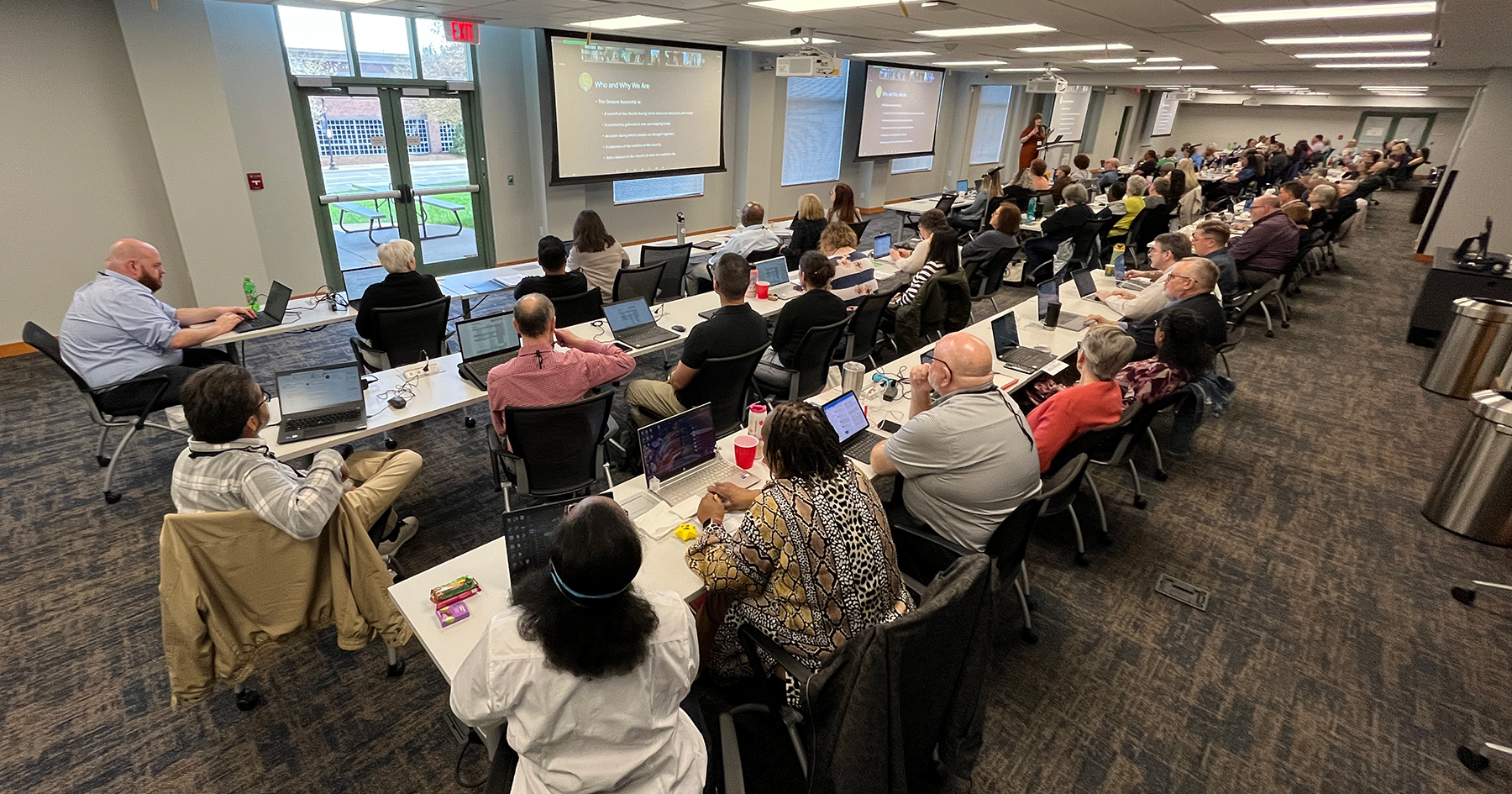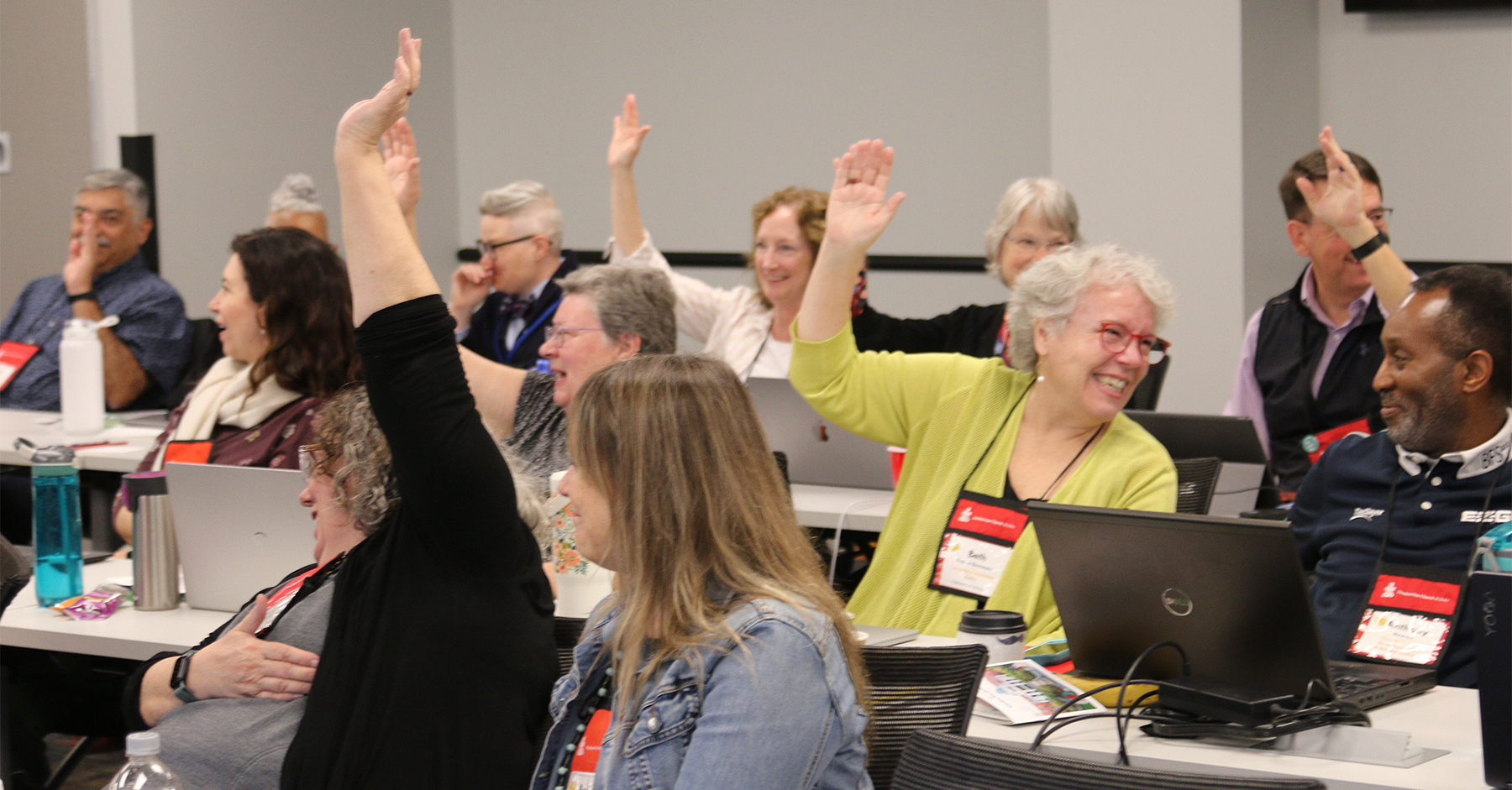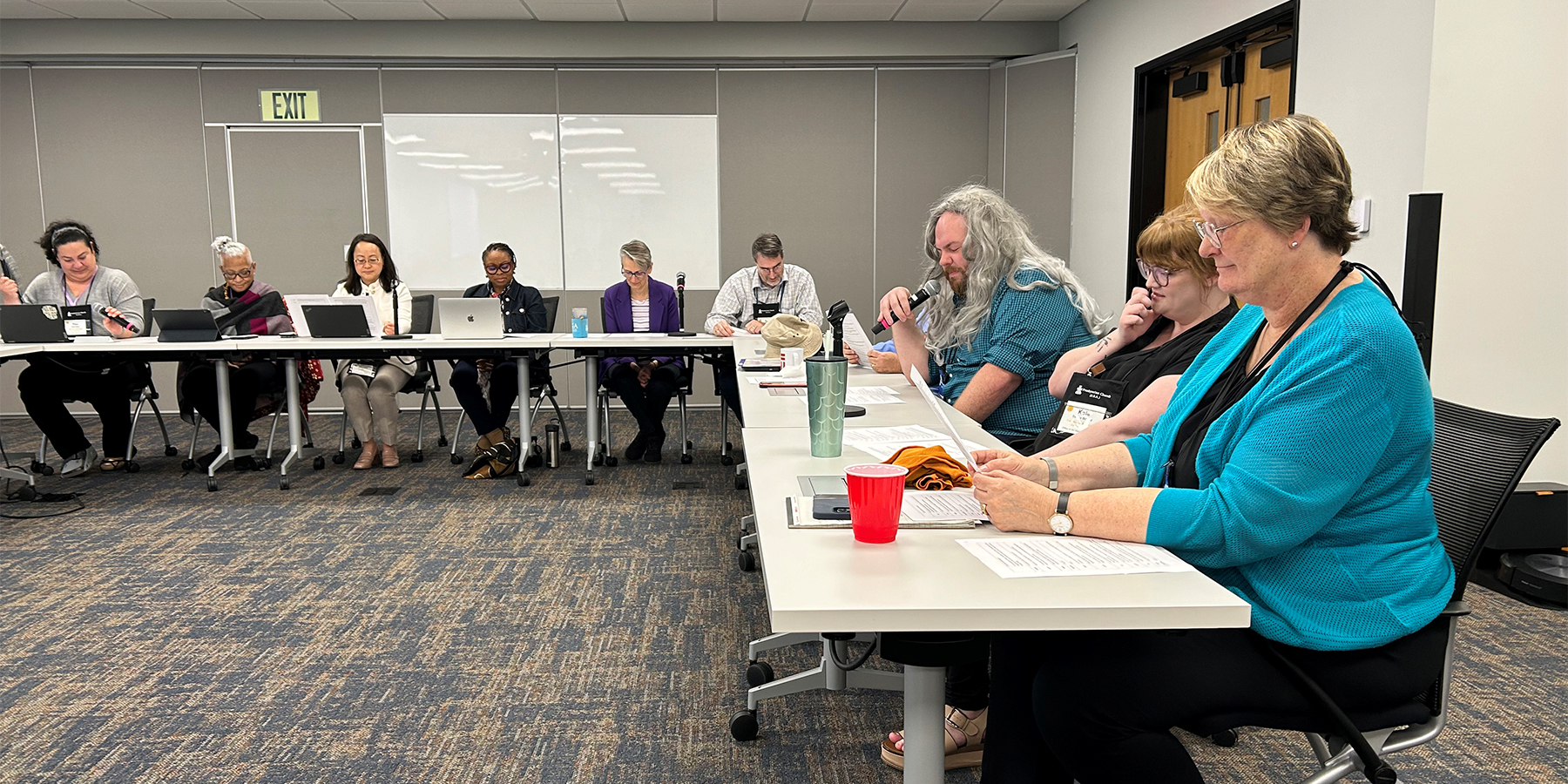
Leaders of committees for the 226th General Assembly continued to learn their roles during the GA Leadership Briefing. Photo by Randy Hobson.
The more than 130 people attending the General Assembly Leadership Briefing both online and at the Presbyterian Center in Louisville, Kentucky, put in a full day on Tuesday, learning more about their roles as committee leaders and even witnessing a skit depicting a mock committee meeting that nearly went off the rails before righting itself at the end.
The 226th General Assembly of the Presbyterian Church (U.S.A.) is set for June 25 through July 4. Committees are meeting online June 25-27. Plenaries are in person at the Salt Palace Convention Center in Salt Lake City, Utah, June 29-July 4.
Tuesday afternoon’s talks at the GA Leadership Briefing included creating community and worshiping during online committee meetings, practicing parliamentary procedure, learning about the roles of groups of people who will be addressing committees, implementing tools including Choice Points and Equity Primes, and reporting to plenary. The mock committee meeting provided comic relief to committee leaders who’d put in substantial efforts to learn more about what they’re about to experience over the next 10 weeks or so.
valerie izumi, manager for General Assembly Nominations, discussed creating online communities, “something you’re used to” after years of pandemic, izumi said. Committee members can learn about one another by briefly answering questions like “My life fundamentally changed when …” or “How can I pray for you this week?” Committee leaders often ask committee members to make a brief video explaining who they are, izumi noted.
The Rev. Dr. David Gambrell, associate for Worship in the Office of Theology & Worship, offered leaders three things to keep in mind when planning committee worship: start with Scripture, remember the body, and glorify and enjoy God.
The Book of Common Worship offers “great models for brief services,” he said, and in the Glory to God hymnal, services of worship begin on page 1. The Daily Prayer App — “There’s an app for that,” Gambrell joked — can also be used to aid committee worship. The Equip website will also host sample ideas for worship, he said.
Together with his colleague, Phillip Morgan, the associate for Music in the Office of Theology & Worship, Gambrell is working on songs and hymns that will be posted on YouTube or some other readily accessible site. They’ll come with copyright permission and slides with words and music. “It won’t be everyone’s favorite hymn,” Gambrell said, “but we’ll try to provide some good ones.”
The Rev. Tricia Dykers Koenig, associate director for Mid Council Relations in the Office of the General Assembly and the parliamentarian for the upcoming Assembly, took committee leaders through many of the processes and decisions they’ll need to make about committee proceedings, such as setting time limits for people to speak, determining the array of resource persons the committee will hear from, and using the committee’s parliamentarian for best effect.
“We parliamentarians don’t want a lot of airtime,” she said. “But if you think you’re getting a little off, ask. It’s better for the moderator and vice moderator to ask the parliamentarian, ‘Can you give us some advice on this?’”
“Preparation can’t guarantee a good meeting,” Dykers Koenig said, “but bad preparation almost certainly ensures a bad one.”
The Rev. Ellen Sherby, associate director for Global Connections in Presbyterian World Mission, announced the names of seven of the eight Mission Advisory Delegates scheduled to attend the upcoming Assembly: Jieun Kim Han, Mark Hare, Josh Heikkila, Dori Hjalmarson, Noah Park, Doug Tilton, Ryan White, with one more to be determined.

Committee leaders honed all manner of skills during the General Assembly Leadership Briefing, including forming online community. Photo by Randy Hobson.
Dr. Dianna Wright, director of Ecumenical & Interreligious Relations in the Office of the General Assembly, said that 10 international and five domestic Ecumenical Advisory Delegates were elected during the 225th General Assembly to attend the 226th.
Carla Campbell, Moderator of the Advisory Committee on the Constitution, called the ACC’s eight members people “who care deeply about the polity of the PC(USA). There are more of you than us, so you may not see us in your committees. But no matter how much we prepare, things come up, and suddenly there are constitutional implications.”
“We are polity nerds, and we wear that proudly,” Campbell said. “We all share a deep commitment to the unique polity of the church.”
“We take our work very seriously, but we do it out of deep love,” Campbell said. “We see it as serving God’s people with energy, intelligence, imagination and love.”
Robin Pugh and Amanda Craft offered up a brief primer on innovations rolled out during the most recent Assembly, Equity Primes and Choice Points.
Among their many considerations, committee leaders do well to keep these questions in mind as it comes time for committee members to vote, Pugh and Craft said:
- Do we have enough information to make an equitable/inclusive decision?
- Who is included and/or excluded from this decision? Who does this decision impact? Have we heard directly from those who will be impacted?
- Who does this benefit and how?
- How might this decision exclude or harm a group or groups?
- Have we thought about the impact on the whole church?
- What additional voices/information do we need to make an equitable/inclusive decision?
“It’s important to focus on ways implicit bias lives in all of us,” Craft said. “We hope you will engage the tools and your Equity Support Manager and encourage your committee members to utilize them.”
Kerry Rice, an Associate Stated Clerk in the Office of the General Assembly, asked leaders to imagine it’s Thursday, June 27. “Your committee work is done. Your work is not,” Rice said, eliciting chuckles. Committee leaders need to certify the actions the committee took and select which items will appear on the consent agenda for an upcoming plenary session. They must also decide who’s going to participate in the committee’s report and the order in which committee recommendations will be presented.
An important rule of thumb is not to write a report that fills all the available time in the committee’s portion of plenary, Rice said. Invariably, a commissioner will pull an item off the consent agenda, requiring committee leaders to speak about that item of business during their report.
Dykers Koenig also walked leaders through the basics of filing a minority report. “The advantage to a minority report is it gets more airtime,” she said. Those who file the report are granted the privilege of speaking from the platform. However, “it takes a lot of the Assembly’s time,” she noted.
The Rev. Jihyun Oh, Director of Mid Council Ministries, led a time on creating the committee’s agenda. Some committee leaders opt to handle the easier items of business near the beginning of the committee’s time together, she said. “It’s a chance to test out the tools and begin to build confidence” queueing up and writing motions, Oh said. “You can see what issues come up before you come to the harder IOBs.”
After a break and just before dinner, committee leaders went to a neighboring conference center room to find it set up for a mock committee meeting. “Think of this as a radio play,” said Kate Trigger Duffert, director of General Assembly Planning. “We’re going to narrate what you would be doing. It’s going to be a little silly.”

During a mock committee meeting offered up Tuesday, the Acting Stated Clerk of the General Assembly of the PC(USA), the Rev. Bronwen Boswell, kept tossing a flag to point out how and where committee members had gotten something not quite right. Photo by Mike Ferguson.
Indeed, it was. When the committee started veering off track, the Rev. Bronwen Boswell, the Acting Stated Clerk of the General Assembly of the PC(USA), would toss a flag just like officials in the National Football League do and say, “wait,” followed by an explanation about the committee mischief that had just ensued.
“Wait!” Boswell said early on. “Resource persons should not share their opinions. How shall we handle this?”
“I’m sorry, Moderator,” the resource person said. “I will restrain myself and say only what’s expected of me.”
Rather than just do what he’ll be doing at the Assembly, Andrew Yeager-Buckley hilariously narrated how people will be given voice and then silenced when their time is up.
At one point, a committee member fell asleep. “The Zoom manager should not unmute someone if they are clearly asleep,” Boswell said sternly. The committee moderator should “move on as though they were not acknowledged.” The committee assistant “should reach out to the commissioner by phone” to make sure they’re OK.
Later, Trigger Duffert, playing the role of a corresponding member, announced, “I am now going to say something incredibly inflammatory. I hope people agree with me or will get out of the church.”
At that point, Oh, playing the moderator, paused the meeting, and the Zoom manager created a breakout room for committee leaders to decide what to do. By the time they concluded that brief consultation, decorum had been restored, and the rest of the meeting was conducted decently and in order.
The General Assembly Leadership Briefing concluded Wednesday afternoon. Watch PC-Biz to learn more about items of business coming before commissioners and advisory delegates to the 226th General Assembly. Go here to learn more about GA226.
